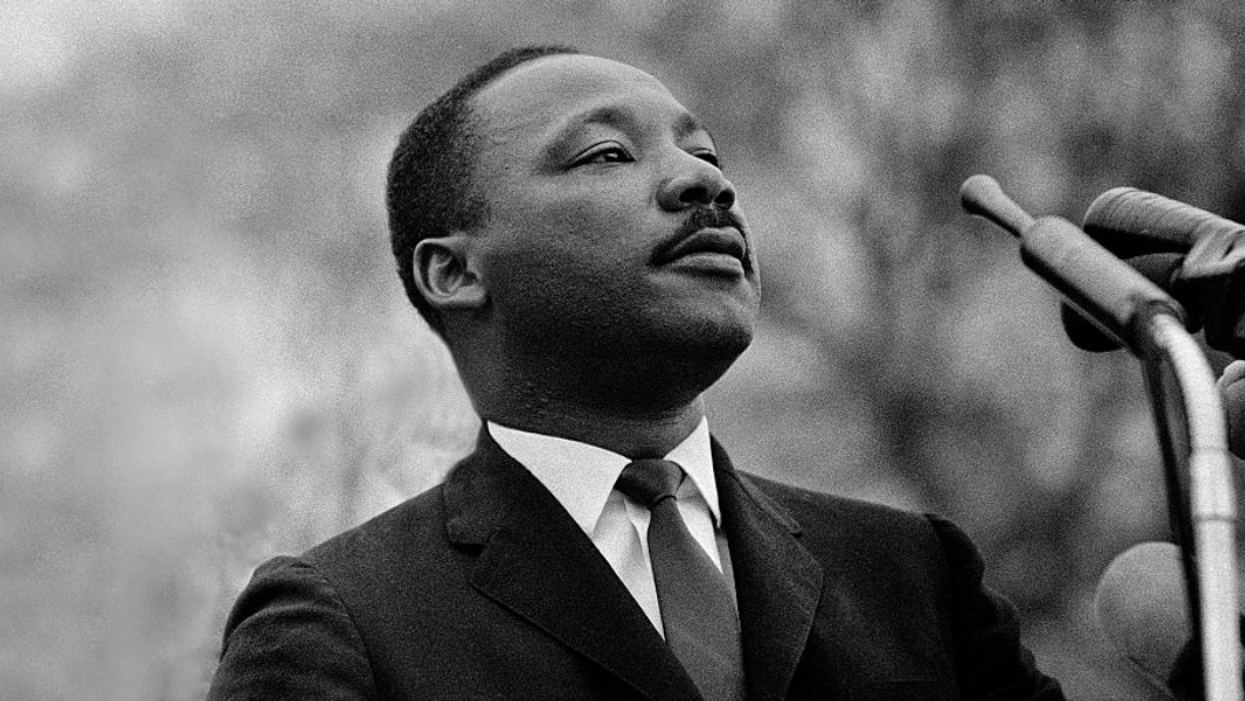Anderson edited "Leveraging: A Political, Economic and Societal Framework" (Springer, 2014), has taught at five universities and ran for the Democratic nomination for a Maryland congressional seat in 2016.
In a country torn and packed with anger, cruelty, pain and violence, love, empathy and sympathy would all be extremely valuable. Yet they are all hard to come by when the Democrats and Republicans have been at each other's throats for years and the issues that divide them concern abortion, guns, racial strife, jobs, immigrants, the minimum wage, and the national debt.
The Rev. Dr. Martin Luther King, Jr. advocated nonviolent resistance in order to eliminate social and economic injustice toward African Americans and "ultimately" create the "beloved community." In this community love would triumph over hate, but it would be a God-inspired love more than a personal love of family members. King called for forgiveness, empathy, redemption, respect and reconciliation.
In our current political climate, getting Democrats to empathize with election deniers and Republicans to empathize with pro-choice Democratic women is too tall an order. And eliciting sympathy or genuine care for one's political opponents who want guns or want corporations to pay higher taxes is just asking too much. Cognitive understanding of one another, however, may be in reach.
For the record, it is important to appreciate that almost all political theorists since Plato have not defended theories of the just society by focusing on capacities for empathy or care or sympathy. Most of them, especially the leading figures in both the liberal and socialist traditions, have drawn on muscular concepts of human rights, social contracts, autonomy, alienation, exploitation, and laws of economic determinism to ground their theories. They all certainly talk about desires, but feelings are traditionally regarded as too fleeting and personal to provide an adequate foundation to justify political practices for a state.
Admittedly, some British philosophers who defended capitalism and liberalism, including Adam Smith, David Hume and Jeremy Bentham, have given considerable attention to concepts of human sentiments. Yet even these thinkers, like other political theorists, as a rule, have created linkages between feelings and more general concepts like impartiality. Only in recent decades have a range of feminist moral and political philosophers, many influenced by Carol Gilligan's groundbreaking work in moral psychology, supported an "ethics of care" and a "politics of care." They made some ground on paid parental leave, child care and elder care, but the dominant disputes about political economy and international relations have been out of reach.
Given the rancor and hostility of our politics today, seeking cognitive understanding of each other is a much less daunting task. It is not necessary to get someone to respect your point of view for them to empathize with you. Empathy requires feeling what the other feels. It means imagining the pain she has, really feeling it, when she lost a child to cancer or a gun wound. Empathy is a beautiful human capacity. But it can be very hard to cultivate, and some people may be genetically ill equipped to be empathic.
Our politics thus needs more mutual understanding -- more talking, more listening, more efforts to understand others and their suffering, and more efforts to understand their moral and empirical beliefs and values. Empathy can enrich understanding, but you can achieve a good deal of understanding without employing a capacity for empathy. We don't use empathy to understand geometry, biology or physics. Cognitive understanding is powerful. It involves using our rational capacities to grasp facts, concepts and theories. It can also help us understand each other.
Understanding others is not sufficient to resolve conflicts, though it is necessary. We will never make progress if we don't even know what our opponents believe and stand for and why. Perhaps the best place to start is with the 43% of Americans (according to Gallup) who identify as independents. After all, all Americans are not pure Democrats or pure Republicans. And many of those independents would be more likely to move more in the direction of what King called the "beloved community."
Rev. Dr. Martin Luther King, Jr. promoted the use of dramatic nonviolent protest to foster better understanding of the injustice of discrimination. He wanted to mobilize African Americans to fight the discrimination, domination and death that afflicted them. He also sought to mobilize what he always called the "white moderate." His impact was monumental. At this time in our history, using our cognitive powers to improve our understanding of one another is a realistic goal. Seeking the beloved community could take us off track, even though we may at some point be able to seek this ultimate end.



















 Senate Committee on Commerce, Science, and Transportation ranking member Sen. Maria Cantwell (D-WA) (R) questions witnesses during a hearing in the Russell Senate Office Building on Capitol Hill on February 10, 2026 in Washington, DC. The hearing explored the proposed $3.5 billion acquisition of Tegna Inc. by Nexstar Media Group, which would create the largest regional TV station operator in the United States. (Photo by Chip Somodevilla/Getty Images)
Senate Committee on Commerce, Science, and Transportation ranking member Sen. Maria Cantwell (D-WA) (R) questions witnesses during a hearing in the Russell Senate Office Building on Capitol Hill on February 10, 2026 in Washington, DC. The hearing explored the proposed $3.5 billion acquisition of Tegna Inc. by Nexstar Media Group, which would create the largest regional TV station operator in the United States. (Photo by Chip Somodevilla/Getty Images)
